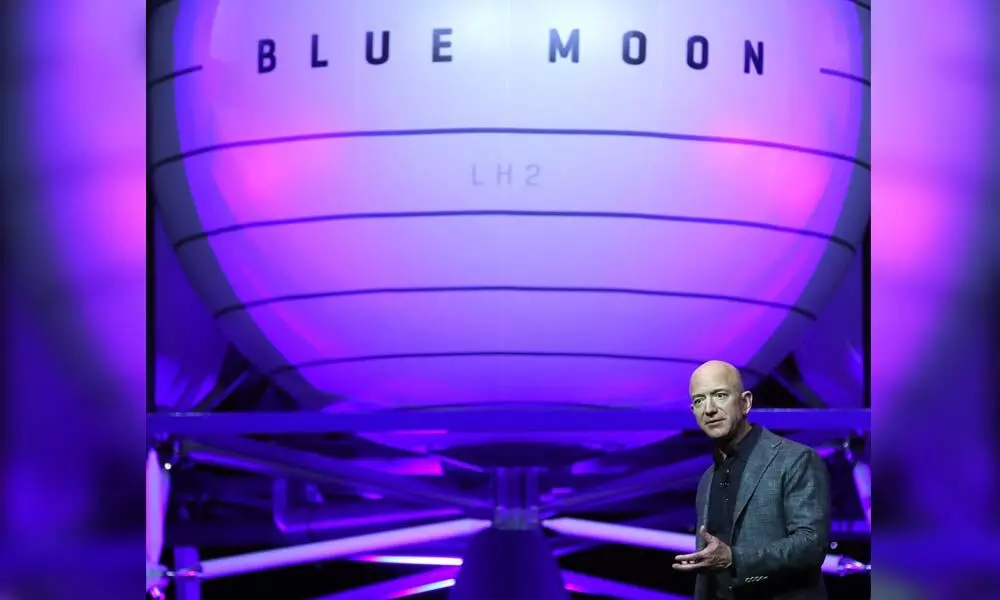Why America's crewed space program struggling to get off the ground again?
Congress making spaceflight harder and more expensive - and not for the first time
image for illustrative purpose

In April, a group led by Jeff Bezos's Blue Origin lost out on a competitive bid to build the lander to Elon Musk's SpaceX. Bezos loudly protested. Now, rather than leaving the fight to the plutocrats, Congress might expand the pool of money - and potentially make both men winners
Last week, the Senate passed a measure that would allot $10 billion over five years for NASA to develop two new lunar landers. Buried in a nearly $250 billion bill intended to boost innovation, the measure was equal to about 43 per cent of the space agency's total budget.
Why the extravagance? On one level, it surely makes sense to build a backup lander if astronauts are going to return to the moon in 2024 as planned. But there may also have been a less reputable motive. In April, a group led by Jeff Bezos's Blue Origin lost out on a competitive bid to build the lander to Elon Musk's SpaceX. Bezos loudly protested. Now, rather than leaving the fight to the plutocrats, Congress might expand the pool of money - and potentially make both men winners.
That would be a mistake. The fact is, Congress screwed up the bidding process for this project the first time around, and its fix is likely to lead to delays and added costs, not to mention (understandable) complaints about a billionaire bailout. The incident neatly sums up what's wrong with the way Congress funds and directs space policy.
For decades, the biggest barrier between Americans and outer space hasn't been technology, engineering or courage. It's been money. Just months after Neil Armstrong first walked on the moon, NASA began cancelling some of its future landings. Yet even as budgets tightened, ambitions remained steady to a fault. In 2003, the board tasked with investigating the Space Shuttle Columbia disaster noted that NASA had become "an organization straining to do too much with too little."
One way to fix that problem is to boost its budget. The problem is that lawmakers tend to spend too much on things NASA doesn't need, while short changing things it does. In 2011, Congress ordered the agency to develop the Space Launch System, a giant rocket based on antiquated technology, at Alabama's Marshall Space Flight Center (a major employer that Alabama Senator Richard Shelby is adept at keeping flush with funds). The result has been an over-budget and overdue rocket that still hasn't flown.
Another approach is for NASA to become a customer. In the mid-2000s, the agency began offering competitive grants for companies to launch cargo to the International Space Station. It was a success: In return for a relatively modest $800 million, SpaceX and Orbital Sciences Corp. (now part of Northrop Grumman Corp.) developed two new rockets and two new cargo spacecraft. A few years later, a similar program produced SpaceX's Dragon craft, which last year successfully ferried two astronauts to the space station. If not for persistent budget shortfalls, that launch likely would've taken place much earlier.
Those successes inspired NASA to hold a competition to develop landers for a proposed trip to the moon. Last year, the agency chose SpaceX, Dynetics Inc. (a unit of Leidos Holdings Inc.) and a team of traditional space contractors led by Blue Origin as competitors. Initially, NASA envisioned selecting two teams to build landers. But while the agency requested $3.3 billion for the program in 2021, Congress authorized just $850 million. As a result, NASA chose only one proposal: SpaceX's.
Blue Origin and Dynetics both filed protests, and NASA suspended the program pending the outcome. Some of the companies' suppliers argued that a single lander was a threat not just to safety but to jobs and the broader economy. Senator Maria Cantwell of Washington, Blue Origin's home state, took notice. Shortly after SpaceX's win, she introduced an amendment that would require NASA to pick a second winner within 30 days of enactment, and authorize $10 billion over five years for the project.
That would be enough to pay for both proposals. But the bill is moving the goalposts on NASA and the bidders to the detriment of both. Had Congress initially offered that sum, both companies almost certainly would've proposed something different. Now Blue Origin gets more money for a design that NASA judged inferior and too expensive. NASA gets two landers that aren't as good as they could've been. And the lunar-landing program will likely face more delays and higher costs. Meanwhile, Cantwell's colleagues are already challenging the provision; shortly after it passed committee, Senator Bernie Sanders offered an amendment to "eliminate the multi-billion dollar Bezos Bailout."
Such tension and uncertainty could've been avoided had lawmakers simply appropriated enough money to fulfill their mandates in the first place. But spats like this help explain why America's crewed space program has been struggling to get off the ground again. (Bloomberg)

